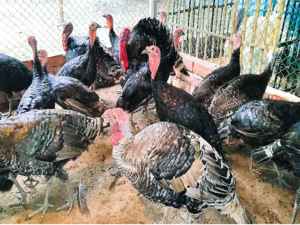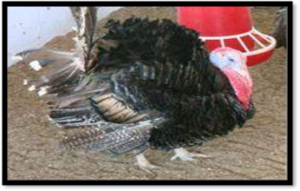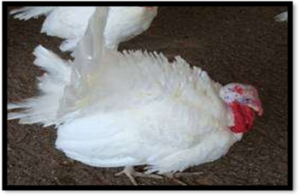TURKEY FARMING
Deepika Jamadar1, Meenaxi2
1 Assistant professor, Veterinary College, Bidar.
2 Livestock Production and Management, Veterinary College, Bidar
 |
|
In India, the turkey bird is known as Turkin. The domestication of turkeys likely commenced with the indigenous peoples of pre-Columbian Mexico. Turkeys constitute a significant portion of the poultry population, ranking closely behind chickens and ducks. Primarily raised for their meat, turkeys offer the leanest poultry meat. They make up approximately 2% of the total poultry population. Kerala and Tamil Nadu are the primary states for turkey farming, with birds also present in Manipur, Nagaland, and Tripura. The practice of turkey farming is rapidly gaining popularity in southern regions. Turkeys boast a dressing percentage of 72% and produce eggs weighing around 80 grams. Elite stocks of turkeys are maintained at Tanuvas in Chennai, Cari in Bareilly, and the Central Poultry Development Organization.
Keywords: turkey Varieties,Economic traits, Rearing system, Incubation.
| Parameters | Values |
| Sex ratio | 1:3 to 1:4 |
| Average egg weight | 70 g |
| Average weight of day old poult | 50 g |
| Age at sexual maturity | 24 to 28 weeks |
| Average egg production per bird per year | 80 to 100 nos |
| Average poult obtained per female per
year |
50 to 60 |
| Incubation period | 28 days |
| Highest egg production period | 28 to 52 weeks |
| Market age | 16 wks |
| Market weight | Male 3.5 kg, Female 2.5 kg |
| FCR (16 weeks) | 3.5 |
| Mortality during first eight weeks | 3 to 4 % |
| Characters | Tom | Hen |
| Caruncles | Red fleshy protuberance on head | Absent |
| Snood | Fleshy protuberance near the base of the beak | Small, thin, non-elastic |
| Beard | Present | Absent |
| Strut | Present | Absent |
TURKEY VARIETIES
Board breasted bronze
- Plumagecolor-black
- Females have blackbreastfeatherswithwhitetip
Board breasted white
- Board-breasted bronze X White Holland
- Plumage color- white
- Better heat tolerance
Beltsville small white
- Resembles the Board breasted white in color and shape but smaller in size
- Egg production, fertility and hatchability tend to be higher
- Broodiness tends to be lower than heavy varieties
ECONOMICT RAITS
ADVANTAGES
- Beingproducedaroundtheyear
- Noreligioustaboo
- Moredisease-resistantthanchicken
- Goodforagers, feedcosts canbeminimized
- Ideally suitedforsemi-intensive orrangesystemofrearing
DISADVANTAGES
- Criticalinputsare noteasilyavailable
- Management ofturkeypoultsismore difficult
- So,theyarenotableto mate thehensfrequently, fertilityrateislow
- FCR(5.2:1)lowerthan chicken(1.8:1)
SYSTEMOFREARING
FREE RANGE SYSTEM
- Free-range rearing system in turkey farming involves allowing turkeys access tooutdoor areas where they can roam, forage, and exhibit natural behaviors. This system aims to promote animal welfare, enhance meat quality, and minimize environmental impact. Turkeys raised in free-range systems have access to natural vegetation, sunlight, and fresh air, which can contribute to their overall health and well-being.
- Maximumstockdensity-1000hens/ha and each hen -10 m2
- The free-range rearing system in turkey farming offers significant advantages such asa 50% reduction in feed costs and a high cost-benefit ratio. However, it comes with certain disadvantages, including management challenges during disease outbreaks, the need for a larger area for the turkeys to roam, and a higher proportion of dirty eggs.
SEMI-INTENSIVE SYSTEM
- Existing farm building usually open fronted with an adjoining yard
- Maximum stock density-less than 4000 hens/ha
- Each hen-2.5m²
· Advantages of the system include low capital costs and continuous daytime access to open-air runs. However, disadvantages include management challenges during disease outbreaks, the need for larger areas, and a higher proportion of dirty eggs.
INTENSIVE REARING SYSTEM
A. Deeplitter:
- Maximum stock density- not morethan 7 hens perm²
- Advantages of this system include increased manure value and availability of vitamins B2 and B12. However, disadvantages include the need for high-quality litter, susceptibility to litter-borne diseases, and the generation of ammonia odor.
Cagesystem:
- cage system can be adopted in dayold turkey, poults till they attain 8weeks ofage
- Advantages of the system include enhanced production efficiency and improved management practices leading to better disease control. However, the system requires a high initial investment compared to traditional cage system
TURKEY INCUBATION METHODS
The incubation periodis 28 days in turkey
I. Natural incubation with broody hens:
• Good brooders
- The broodyhencanhatch10-15numbersofeggs
- 60-80%hatchabilityandhealthypoults
II. Artificial Incubation:
- Eggsarehatchedwiththehelp ofincubators
- Egg shouldbeturnedathourlyintervalsdaily
- Setter and hatcher relative humidity(%) are 61-63 and 85-90 respectively
- Temperature (degreef) is 99.5 for both setter and hatcher.
SEX DETERMINATION
MatingSystem
- NATURAL MATING:
- Matingbehavior-strut
- Sex ratio:1:4-mediumtype, 1:3-largertype
- TendencyinTomtodevelopan affinitytowardsapeculiar female so,changeTomevery15days.
II. ARTIFICIAL INSEMINATION
Insemination In Hens:
- AI done when the flock attains 8 to 10 %production
- Volume:0.025to0.030mlofundilutedsemenforevery3 weeks
- Inseminateintheevening
- Averagefertility80to85%
FEEDING MANAGEMENT
| Age(weeks) | Typeoffeed | Protein(%) | Energy(kcal/ kg) |
| 0to6 | Starter | 28 | 2800 |
| 6to8 | Growerfirstdiet | 26 | 2800 |
| 8to16 | Growerseconddiet | 22 | 3000 |
| 16tomarket | Finisher | 16 | 3300 |
| Breeders | Breederdiet | 14 | 2900 |
CONCLUSION
- In turkey is mainly rearing for meat purpose
- Due to its heavy weight cannot be used in retail sales
- Half of the feed you can manage with green fodders because it’s a good foragerbut, because of its poor FCR the feeding cost goes high.
- Turkey rearing is more profitable when there is more demand.
Reference
- Turkey farming guide
- https://agritech.tnau.ac.in








